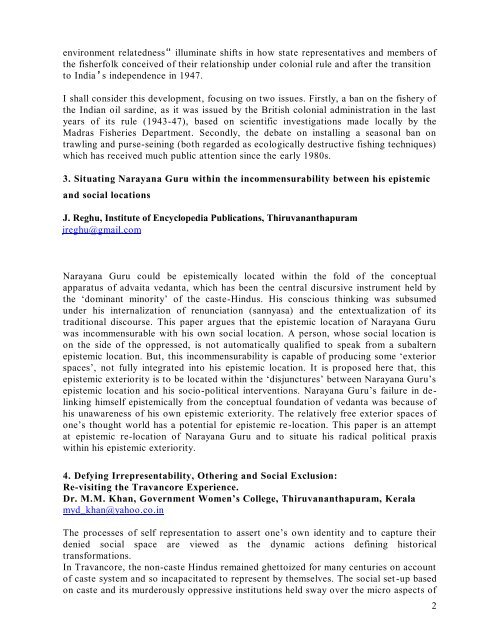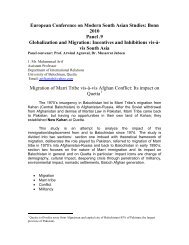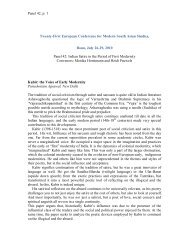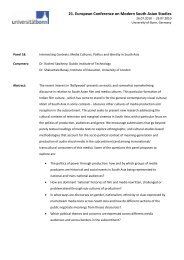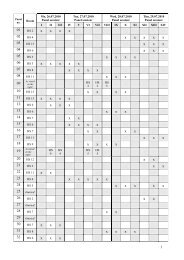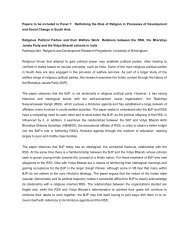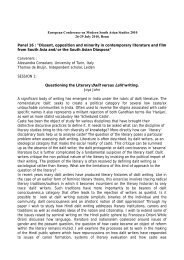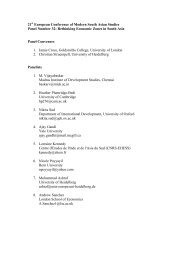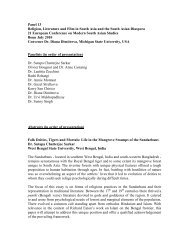Curriculum Vitae - Universität Bonn
Curriculum Vitae - Universität Bonn
Curriculum Vitae - Universität Bonn
Create successful ePaper yourself
Turn your PDF publications into a flip-book with our unique Google optimized e-Paper software.
environment relatedness“ illuminate shifts in how state representatives and members of<br />
the fisherfolk conceived of their relationship under colonial rule and after the transition<br />
to India’s independence in 1947.<br />
I shall consider this development, focusing on two issues. Firstly, a ban on the fishery of<br />
the Indian oil sardine, as it was issued by the British colonial administration in the last<br />
years of its rule (1943-47), based on scientific investigations made locally by the<br />
Madras Fisheries Department. Secondly, the debate on installing a seasonal ban on<br />
trawling and purse-seining (both regarded as ecologically destructive fishing techniques)<br />
which has received much public attention since the early 1980s.<br />
3. Situating Narayana Guru within the incommensurability between his epistemic<br />
and social locations<br />
J. Reghu, Institute of Encyclopedia Publications, Thiruvananthapuram<br />
jreghu@gmail.com<br />
Narayana Guru could be epistemically located within the fold of the conceptual<br />
apparatus of advaita vedanta, which has been the central discursive instrument held by<br />
the „dominant minority‟ of the caste-Hindus. His conscious thinking was subsumed<br />
under his internalization of renunciation (sannyasa) and the entextualization of its<br />
traditional discourse. This paper argues that the epistemic location of Narayana Guru<br />
was incommensurable with his own social location. A person, whose social location is<br />
on the side of the oppressed, is not automatically qualified to speak from a subaltern<br />
epistemic location. But, this incommensurability is capable of producing some „exterior<br />
spaces‟, not fully integrated into his epistemic location. It is proposed here that, this<br />
epistemic exteriority is to be located within the „disjunctures‟ between Narayana Guru‟s<br />
epistemic location and his socio-political interventions. Narayana Guru‟s failure in delinking<br />
himself epistemically from the conceptual foundation of vedanta was because of<br />
his unawareness of his own epistemic exteriority. The relatively free exterior spaces of<br />
one‟s thought world has a potential for epistemic re-location. This paper is an attempt<br />
at epistemic re-location of Narayana Guru and to situate his radical political praxis<br />
within his epistemic exteriority.<br />
4. Defying Irrepresentability, Othering and Social Exclusion:<br />
Re-visiting the Travancore Experience.<br />
Dr. M.M. Khan, Government Women’s College, Thiruvananthapuram, Kerala<br />
myd_khan@yahoo.co.in<br />
The processes of self representation to assert one‟s own identity and to capture their<br />
denied social space are viewed as the dynamic actions defining historical<br />
transformations.<br />
In Travancore, the non-caste Hindus remained ghettoized for many centuries on account<br />
of caste system and so incapacitated to represent by themselves. The social set -up based<br />
on caste and its murderously oppressive institutions held sway over the micro aspects of<br />
2


